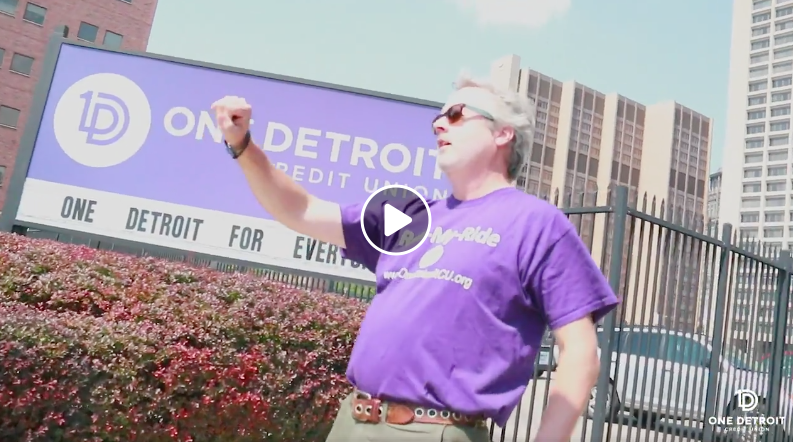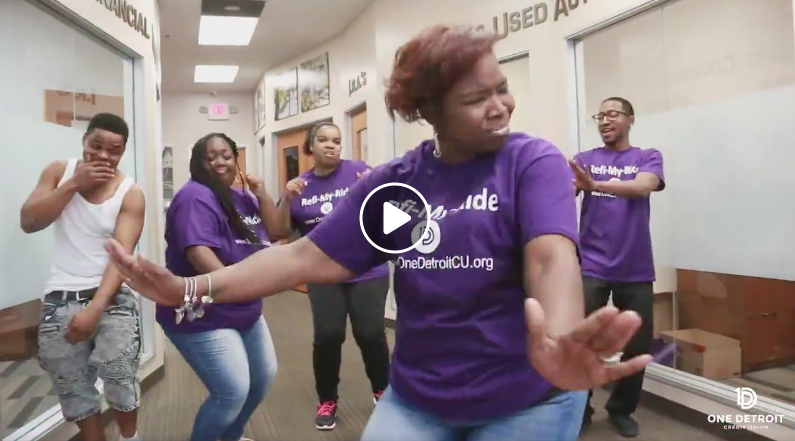One Detroit Credit Union: We’re Here for Everybody
By Sarah Snell Cooke, Cooke Consulting Solutions
Some say two Detroits exist. While downtown is booming, it’s only a small sliver of Detroit. The surrounding neighborhoods have not been achieving the same success, where poverty runs high, according to CityLabs.com. In its so-called recovery, jobs for mostly white suburbanites increased 16.6% last year; jobs for city residents are down 35.5%.
 In true credit union fashion, Hank Hubbard’s credit union is working to raise up all residents of all of Detroit, even rebranding the credit union as One Detroit Credit Union a couple years ago. He explained the city’s narrative has been that there’s a 10-square mile area of the city that is being revitalized while the other 130-square miles are being neglected. The suffering in the neighborhoods is only held in sharper contrast with the success of the downtown area.
In true credit union fashion, Hank Hubbard’s credit union is working to raise up all residents of all of Detroit, even rebranding the credit union as One Detroit Credit Union a couple years ago. He explained the city’s narrative has been that there’s a 10-square mile area of the city that is being revitalized while the other 130-square miles are being neglected. The suffering in the neighborhoods is only held in sharper contrast with the success of the downtown area.
“We want our message to be, ‘We’re here for everybody,’” Hubbard stated. One Detroit created a series of video advertisements to help them spread the word on social media, which has gotten more traction than from this campaign than we have anything else, according to Hubbard. “We feel we’re one of the best kept secrets in Detroit, and we don’t want to be.”
Financial inclusion is a key issue for members of the Underground Community. Learn more here.
Hubbard’s plan is to build strong, assertive growth so One Detroit will become Detroit’s primary financial institution. He added that a lot of banks are parked downtown, but no one is in the neighborhoods. One Detroit recently bought a new headquarters building that’s 30,000-square feet to visually demonstrate its reach as well; move in will be sometime in 2020.
As part of One Detroit’s efforts, the credit union is re-launching its Refi My Ride program, which allows members to refinance their vehicles at half the rate they currently have (minimum 2% APR on the refi). In Michigan, buy here-pay here car lots run rampant, and the state’s maximum interest rate is 25% on auto loans. These dealers no only frequently charge the maximum interest rate, but also charge buyers more than the vehicle is really worth. To grab borrowers’ attention for the program, One Detroit participated in the viral #KikiChallenge on social media, with employees dancing (safely) to the popular Drake song.
 In the four years One Detroit has operated the Refi My Ride program, it’s invested approximately $17 million in new loans and saved members $3.5 million or $50 to $60 a month on average. That’s $5,000 over the life of a single loan that is instead being injected back into the neighborhoods.
In the four years One Detroit has operated the Refi My Ride program, it’s invested approximately $17 million in new loans and saved members $3.5 million or $50 to $60 a month on average. That’s $5,000 over the life of a single loan that is instead being injected back into the neighborhoods.
The average credit score on these loans is about 598, and on average, One Detroit is refinancing 15% loans down to 7.5% loans. When members can show they’d been paying on the previous high-cost loan, the credit union can be more understanding on the underwriting terms, Hubbard explained. He added that the loss ratio on these loans is lower than it is on One Detroit’s general car loan portfolio.
The Underground Community wants credit unions to be the rising tide that lifts all boats. Learn more here.
My Pay Today is the credit union’s payday alternative loan program, which costs members about 25% of what they’d pay at the typical payday loan shop. Members pay an annual fee of $70 to use the services, which provides loans of up to $500 at 18% interest and gives them two months to pay it back. The program has just a 15% loss ratio versus the typically payday loan loss ratio of around 40%. Aggregate fees for the loans total $300,000 compared to $1.3 million at the Check & Go. Hubbard explained that the annual fees alone essentially cover the charge offs. “It’s not a huge money maker,” he said, “but that’s not our business.”
Hubbard tries to keep the state regulators at bay by working proactively with them. The first thing he tells them about “are all the screwy things we’re doing, but they already know we do screwy things.” He emphasizes the work the credit union does to manage the increased risk to avoid the programs being shut down as too risky.
One Detroit’s next step is to continue its message of inclusion and use that the inspire investment from some of the younger consumers moving to the area and newer businesses, so they feel good about banking with a credit union that’s doing so much to help the neighborhoods. In addition to the programs mentioned previously, the credit union takes city blog grants funded by Bank of America to loan $4.2 million in 0% home rehab loans, and employees work with The NOAH Project, which helps to feed the homeless. One Detroit has put its (and other’s) money where its mouth is and is taking action to ensure residents only see one Detroit.
